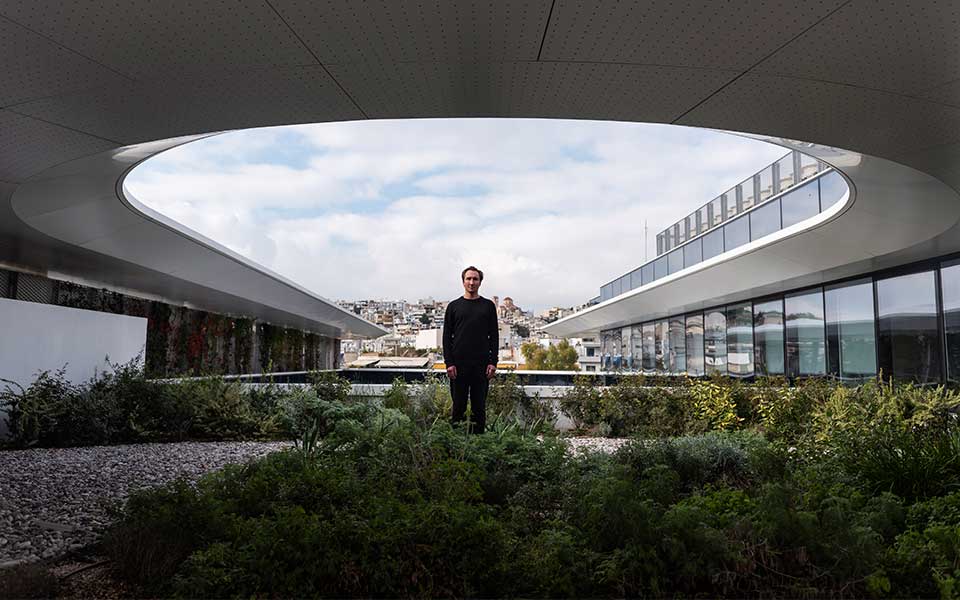From tech gurus and start-up entrepreneurs to cultural workers and restaurateurs, some of Athens' newest residents explain what drew them to the Greek capital.
There was a time, not so long ago, when announcing you had decided to move to Athens would be met with disbelief by locals. But those days are long gone. Athens is a truly cosmopolitan city now and everybody knows it.
“Athens is increasingly international and it’s becoming a real melting pot,” explains Chris Kossaifi, the Lebanese publicist of Carwan Gallery, a new arrival to Piraeus. “We learn a lot from each other: French, Lebanese, English, Greek or whoever; everyone brings new tastes and attitudes to the city, an added value.”
Foreigners long overlooked the Greek capital in favor of the islands. But since the worst years of the Greek economic crisis, Athens has seen an ever-growing stream of foreigners drawn here.
First, it was young artists and creatives, lured by the prospect of cheap rent, available space and a lively and largely rules-free experience of urban life. But as the green shoots of an economic recovery started to sprout and word of an Athens creative and cultural renaissance spread, a more diverse group of foreigners began to arrive to plant their own roots in the city.
The emergence of a start-up scene has been one of the most promising signs of Greece’s post-crisis economic recovery. Greek-owned start-ups now have a market capitalization of €3.5 billion – remarkable when you consider the tech sector was non-existent a decade ago. After years of talking about brain drain, today tech joins Greece’s traditional staple industries of shipping and tourism in thinking about how to attract top talent from around the world in order to help them grow.
There were fears that COVID-19 would bring all this good news to an end. But due to locking down early in March, Greece kept cases remarkably low and emerged from the first lockdown with its international reputation enhanced. Although the economic damage is severe and ongoing, the pandemic appears to have done little to diminish the allure of life in Athens for foreigners. In fact, with workers in a variety of industries forced to work from home due to the pandemic, many have decided to embrace the possibilities of remote working from Athens, formerly the preserve of creative freelancers.
With the country now in the grips of a powerful second-wave of the virus and under a second lockdown, the first days of the Greek Revolution’s 200th anniversary year look set to be challenging. But for the foreign-born new Athenians, hopes are bright for the future of Athens and of Greece in 2021 – and beyond.
“We believe Athens has a very promising future – and I don’t think we’re alone in that,” Kossaifi reflects. “There’s a sense of freedom that Greece offers me, I’ve never felt this free before.” In fact, everyone interviewed for this article mentioned the very same word: freedom.
That would likely bring a smile to the faces of all those who took part in Greece’s fight for independence two-hundred years ago; as for Athens’ latest arrivals at least, their dream of freedom is very much alive.
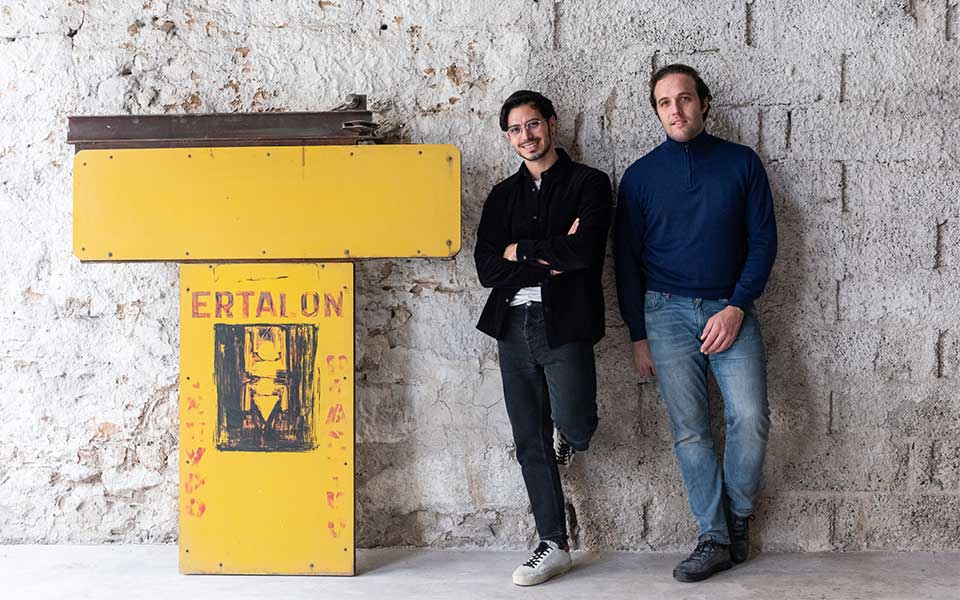
Chris Kossaifi (left) of Carwan Gallery
© Thalia Galanopoulou
Chris Kossaifi, gallerist from Beirut, Lebanon
“We believe the DNA and identity of Athens resembles that of Beirut in many different ways,” explains Chris Kossaifi of Carwan Gallery, which relocated from Beirut to Athens in late 2019 and opened in September 2020.
Carwan Gallery was founded in Lebanon’s capital Beirut in 2011 and was the first design gallery in the Middle East. Ever since, it has collaborated with designers, buyers and cultural organizations to promote collectible design from the Eastern Mediterranean region and beyond.
Chris met the gallery’s two French co-founders Quentin Moyse and Nicolas Bellavance-Lecompte while he was working in Paris in 2017-2018, after originally leaving Lebanon to study there some years earlier. In 2019, Chris moved to Athens to do the gallery’s PR and communication.
While Carwan Gallery was going from strength to strength alongside the local designers they were championing, Lebanon’s growing economic and political turmoil made running a globally-connected business increasingly difficult. Finally, the team took the reluctant decision to leave Beirut. And Athens seemed the perfect place for the gallery’s new home.
Here, the gallery remains within easy reach of its network across the Middle East, yet enjoys the relative stability of the EU and easier access to art institutions and collectible design buyers across Europe.
Chris’ Lebanese citizenship can often make travel and business difficult, but after previously securing residency in France, the bureaucratic process to relocate to Greece was quite simple. Many other Lebanese have made use of the Golden Visa scheme and bought properties in Athens. Chris predicts a new wave of Lebanese injections into the city’s gastronomic and cultural scene over the next few years.
“Athens is a very unique and promising city,” Chris explains. “There’s a lot of foreign investment flowing in and the art scene is flourishing, with openings like ours and the new Gagosian Gallery, for example. Greek people are eager for change, innovation and new things to happen in the city. The energy is really dynamic and you can feel it on the streets.”
In Athens, the gallery finds itself in good company as Carwan joined Rodeo Gallery (which relocated from Istanbul), Intermission Gallery and the Paleo wine bar/restaurant on Polidefkous Street, helping to turn this old industrial area next to the port of Piraeus into a new cultural destination.
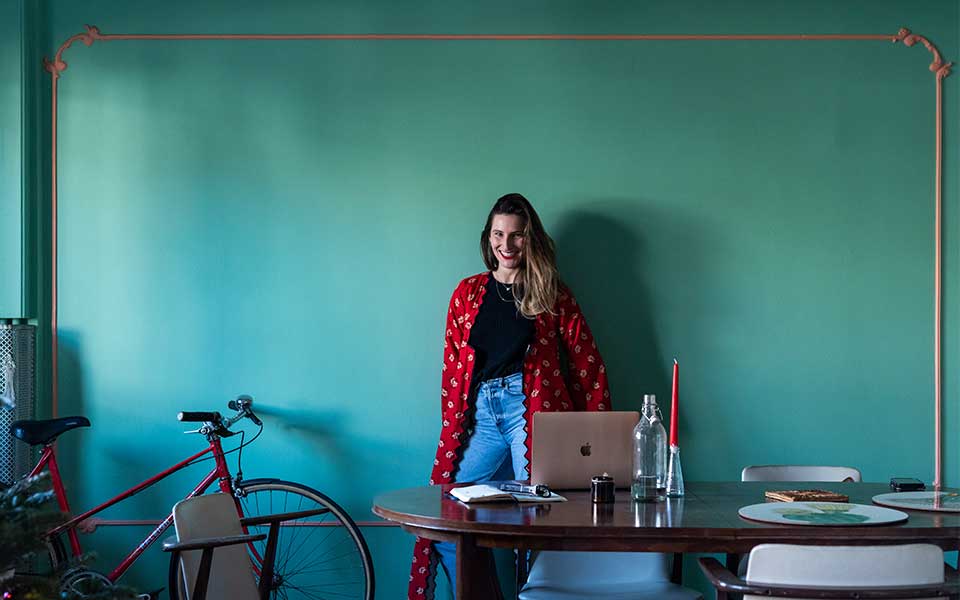
Anastasia Miari
© Thalia Galanopoulou
Anastasia Miari, journalist from the UK
“I really do feel strongly that I’m an absolute 50/50 mix of British and Greek,” says journalist Anastasia Miari. Anastasia was born in Corfu to a Greek father and a British mother. She left Corfu aged 11 for secondary school in the UK and spent her teens in Blackpool, a faded seaside resort in the north of England – where she picked up the slight northern twang that you can still just make out in her voice – before university in Manchester and a decade working in London.
Despite London being a hub for media, Anastasia never felt she flourished there. “In London, you do whatever you can to get by,” she remembers. “I was doing copywriting for hotels and food brands, which is really soul-destroying and boring. But you just don’t make enough as a journalist to get by in London.”
Year-on-year, the London grind became harder and harder to bear, and Anastasia began looking for a new base. “I first came to Athens in 2014 and had the most amazing time, the nightlife just sucked me in,” she says. “At that time, Athens felt edgy in a way that Hackney [in East London] was maybe twenty years ago. Athens just felt so much more exciting than London.”
After returning from Buenos Aires to London and a particularly bleak British winter, she decided that enough was enough and relocated to Athens in March 2018. “I hit the ground running,” she explains. “Editors realized I was in Greece and people started coming to me for the first time. The much lower cost of living meant I could spend more time developing stories and other projects, such as films and podcasts.”
Anastasia has lived an enviable life ever since: jetting around the Greek islands each summer for travel publications, while also being commissioned for stories further afield, such as Italy, Montenegro and Moscow. She was also tasked to write the Wallpaper City Guide to Athens and finished writing her book Grand Dishes, which celebrates time-perfected dishes by grandmothers from around the world, includes Anastasia’s own Greek yiayia and will be released in March 2021.
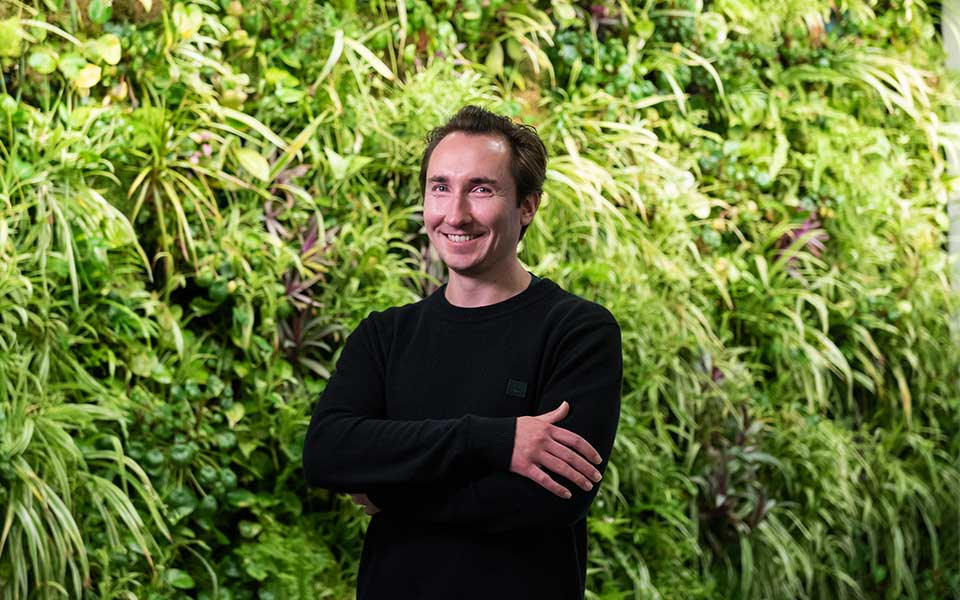
Erik Polus
© Thalia Galanopoulou
Erik Polus, tech executive from Finland via the US
After nearly a decade of working in tech in the United States, Erik Polus decided it was time for a change. Grinding for a year in San Francisco then another seven in New York City’s competitive start-up scene had given him an enviable CV, which allowed him the pick of tech jobs anywhere in the world. So, where to go?
Erik didn’t want to go back to California, where his family had moved from Helsinki when he was 12, or any of the other US tech hubs, such as Chicago or Austin. So Erik began looking at the EU, in cities with established tech scenes, such as Berlin, Amsterdam and Barcelona. “I wanted to leave the US but move to another big city,” Erik explains. “My priorities in life are being able to walk to work, eat whatever I want, whenever I want and usually that means living in the city center.” But at this point, Athens wasn’t even on his radar.
Beat (formerly Taxi Beat) was founded in 2011, after Nikos Driandakis couldn’t find a taxi in Athens’ northern suburbs. Before smartphones became ubiquitous and Uber moved into the taxi market, Driandakis created an app to connect passengers with nearby drivers. Beat made headlines when it was bought by Germany’s Daimler in February 2017, which was Greece’s greatest start-up success story at the time.
Now Beat is part of Free Now, the ride-hailing joint venture between BMW and Daimler, whose COO circulated Erik’s CV around the group. Within days, Erik had an interview at Beat. He had never been to Athens before and friends in NYC were far from complimentary about the city. But the salary and position (Erik is now Vice President of Growth) were enticing enough that he accepted, after a short orientation visit.
Erik arrived to find Greece covered in snow in January 2019, but his Athens experience has improved consistently ever since. “I went from the worst possible day of the year to having the most epic summer on the planet,” Erik remembers. “Now I’m enjoying a lifestyle I couldn’t possibly enjoy in NYC or San Francisco. Athens is an under-rated city, through and through, which reflects itself in the hospitality, camaraderie and all the ways you can enjoy yourself here. I feel like I’m ahead of the curve: the big Greek tech companies are still figuring out how to attract top talent to Athens, but once they do it’s going to be a completely different city.”
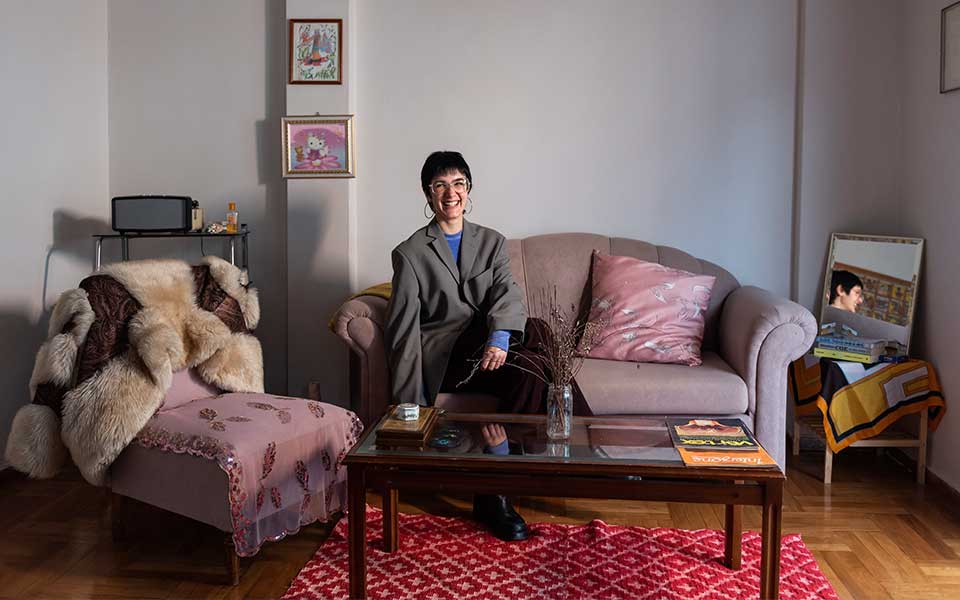
Rebecca Rendina
© Thalia Galanopoulou
Rebecca Rendina, art student from Italy
“It was love at first sight,” remembers Rebecca Rendina, of her first experiences in Athens after deciding to move here to study. Despite growing up in Rome with a Greek mother, Rebecca had never spoken Greek at home and her only glimpses of Athens had been on the way to Piraeus for family holidays in Crete. “All I remembered from my childhood were spanakopita and freddo espresso,” she explains. “I didn’t know anything about Athens or that it had such a flourishing art scene. I was just looking for somewhere I could continue my studies once I finished high school.”
After other options fell through, Rebecca moved to Athens in November 2016 aged 18 with a plan to study for the entrance exam to the Athens School of Fine Arts (ASFA). The exam consists of a week of life drawing ancient Greek statues and Rebecca was among the less than ten percent of students accepted from a field of around 1,000 – and it was only then she admitted to tutors that she barely knew any Greek.
Flash forward to today and Rebecca is 22 and in her third year of studying at ASFA’s mixed media lab under Poka-Yio, co-founder of the Athens Biennale. Her Greek has improved massively, thanks to reading, listening and working at VIZ – Laboratory Of Visual Culture and Spirto bar in Exarcheia. She’s now enjoying a student life she feels is superior to what she could have experienced if she had stayed in Rome – or most other big European cities, where students live in far-flung corners of the city.
“The quality of life here is great in Athens,” she explains. “There’s a big concentration of students in the center, so socialising is really easy – all my friends live nearby.” Not only is Rebecca close to other students, but she’s also within easy reach of Athens’ contemporary art scene, which seems much more accessible than in other big cities, where breaking into closed circles is much harder.
“There are plenty of options for artist residencies in Athens and lots of funding opportunities from the Onassis and Niarchos foundations, as well as foreign organizations like the Institut Français or the Goethe-Institut,” Rebecca explains. One of her favourite projects was taking part in a three-day artists’ Live Action Role Play as part of the Onassis Blockchain Festival, which culminated with a Cryptorave at Romantso, presided over by multimedia performance art collective Omsk Social Club.
“I love it when art, fashion and nightlife come together,” Rebecca explains. “There’s such a rawness and unpretentiousness to the nightlife in Athens. It’s more spontaneous than anywhere else I have experienced and it creates space for new things to happen all the time.”
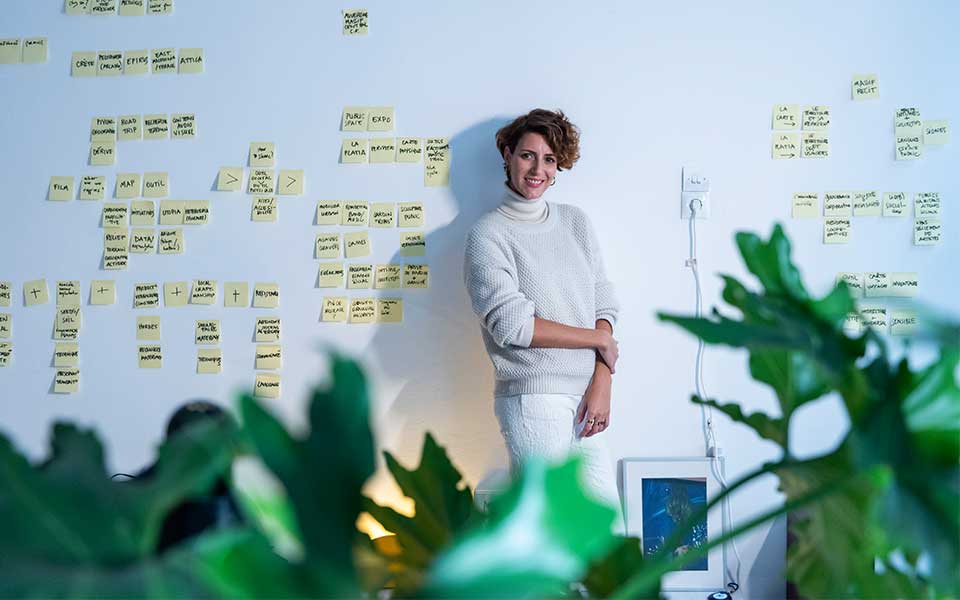
Laure Jaffuel
© Thalia Galanopoulou
Laure Jaffuel, designer from France
“Athens is attracting so many interesting people,” explains designer Laure Jaffuel. “The scene is still quite small so you meet everyone and create relationships quickly. People interact in a very sociable way, it’s a very festive and chaotic lifestyle. But it’s also fertile terrain for collaboration: solidarity is inscribed in the culture. Meeting new people often leads to new projects and working relationships.”
Laure grew up in Montpellier in the south of France and after a decade of studying, working and teaching in Paris, Amsterdam, Copenhagen and New York, began to dream of returning to a Mediterranean climate and style of living. She arrived in Athens in late 2017, in the wake of the Athens edition of the prestigious Documenta contemporary art festival, which firmly placed the Greek capital on the global art map.
Athens proved to be a fruitful location for collaborations with artists and institutions in Greece and across Europe. Despite its reputation for a relaxed pace of life, Laure found Athens to be an ideal base to produce work, too. “Athens is the last big European city with artisan producers and workshops inside the city,” she says. “This is amazing for a designer, as I can just get on the metro to visit my metal fabricator or my marble supplier, for example. Everywhere else in Europe, these craftspeople have been pushed out of the city and are relatively inaccessible.”
A prime focus of Laure’s practice is public space and she has been working on a long-term project with the Onassis AiR Critical Practices program which takes multiple approaches to investigate public space in Athens. She brought her postgraduate students from the Sandberg Institute in Amsterdam over to Athens for a ten-day group project, which was produced in her studio and installed in public spaces around the city. The culmination of the project will be a book, due to be published in early 2021 by the Onassis Foundation and Dolce Publishing.
But perhaps Laure’s most impressive project is her spectacular living, working and hosting space in the central Athens neighborhood of Aghios Pavlos. Formerly a storage space for the municipality, the old katastima sat empty for 12 years until Laure began renovating the 400-square-meter space, which is spread over three floors, including a basement and upper mezzanine.
“I have a strong vision of life and work intertwined,” Laure explains. “There was no way I could afford to buy property or fulfil this vision of mine in any other major European city. I see this space as a tool, to live but also to make work, to invite people to create and have a small workshop. It’s also a project that will continue to evolve in step with my creative entrepreneurship and collaborations with others.”
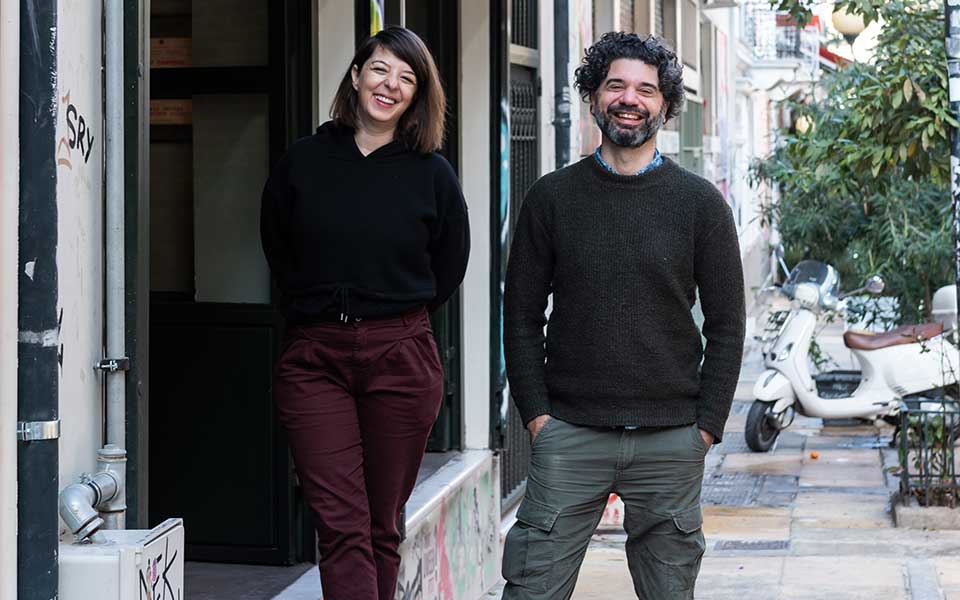
Manuel Capurso
© Thalia Galanopoulou
Manuel Capurso, restaurateur from Italy
London was undoubtedly the most cosmopolitan, culturally rich and commercially significant city in Europe at the beginning of the 21st century. No other European capital could compete. But that all changed in the summer of 2016, when the UK narrowly voted for Brexit. Overnight, millions of foreign-born Londoners, who had contributed so much to making the city the incredible place that it was, no longer felt welcome.
“I had lived in London for 16 years and called it home,” explains Manuel Capurso, originally from Milan. “But after Brexit, I didn’t want to stay in the UK and live as a second class citizen.” For Europeans who previously had the right to live and work freely in the UK, applying for citizenship is both expensive and time-consuming. Manuel decided it just wasn’t worth it.
Manuel didn’t know much about Athens before moving here in January 2019. He had visited Greece a few times for the Athens Photo Festival and Thessaloniki PhotoBiennale. “I had the desire to return to southern Europe again,” Manuel explains. “I thought it would be nice to do something in a place that has been used as the scapegoat for the crisis in Europe. But I really didn’t know Athens very well at all and, honestly, it was a bit of a gamble.”
After working as a photographer and UX designer, Manuel took another gamble when he decided to open a pizzeria in Exarchia, the home neighborhood of his longtime friend and business partner Georgia Strataki. Incorporating the company was easy but there were many hurdles along the way that delayed the opening, such as waiting two months for the gas to be connected. But after nearly a year of research, developing the concept and preparing the space, Valteziana Pizzeria opened in October 2019, on the pedestrianized Valtetsiou Street, across from the iconic open-air Cinema Riviera. All ingredients, including essentials like the pizza flour, mozzarella and prosciutto are Italian – only the vegetables, beer and wine are all Greek.
The high-end offering was well-received until the pandemic forced them to transform the business. “We see pizza like theater: people sit around the big pizza oven and can watch the chef at work,” Manuel explains. “But the restrictions forced us to move everybody outside and shift to delivery-only during the lockdowns. It has been challenging to adapt and the loan from the state doesn’t really compensate for the huge loss in earnings. But if it wasn’t for the pandemic, Athens would be an extremely good place for a food business. Athenians (especially the young) are open to new ideas and flavors and they really appreciate quality.”

